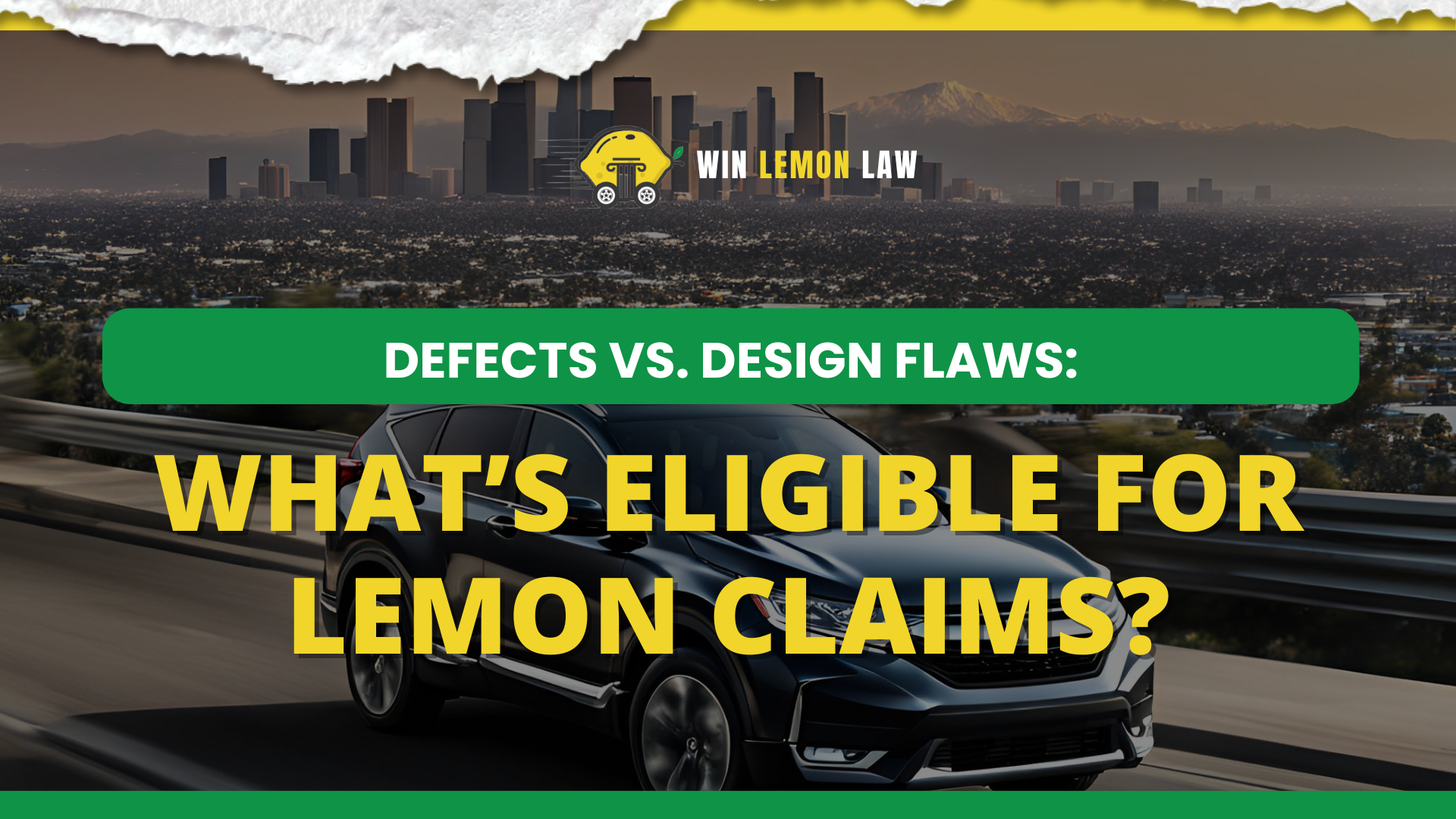Imagine your brand-new car keeps winding up in the shop for the same issue. It’s frustrating, inconvenient, and costly. Naturally, you might assume that if the problem is the manufacturer’s fault, you should be able to file a lemon claim and get a refund or a replacement. In many cases, the answer is yes.
However, things get complicated if the issue is caused by a design flaw instead of a defect. The distinction between these two types of problems—defects and design flaws—can significantly influence whether your case qualifies under California’s lemon law. Both types of issues can severely impact your vehicle’s performance, safety, and value, but the path to resolving them under the law differs.
A defect is typically a problem that arises during the manufacturing process. These are issues that occur due to errors, faults, or irregularities while the vehicle is being built. Defects can often be isolated to specific batches of vehicles or even individual units.
On the other hand, a design flaw is an inherent problem rooted in the vehicle’s blueprint or design specifications. Unlike defects, which are generally isolated incidents, design flaws affect every unit produced according to the same faulty design. This can lead to widespread issues and often requires more complex evidence to prove.
Defining Vehicle Design Flaws
Design flaws are inherent issues that originate from the vehicle’s blueprint or design specifications. These flaws affect every unit produced with the same plans and can lead to widespread problems. Key characteristics of design flaws include:
- Inherent to the Model: Design flaws are part of the vehicle’s original plans and affect all units of the same model. They are not the result of the manufacturing process but stem from the initial planning stages.
- Systemic Issues: Since flaws are part of the vehicle’s design, they tend to cause systemic issues that affect the overall performance, safety, or reliability of the car.
- Widespread Impact: These flaws typically impact a large number of vehicles, potentially leading to recalls or widespread dissatisfaction among consumers.
Examples of Design Flaws
- Inadequate Braking System: A braking system that fails to provide adequate stopping power due to poor planning, affecting the safety of all vehicles with this system.
- Faulty Airbag Deployment: An airbag system that deploys too forcefully or not at all in certain crash scenarios, endangering the passengers in all vehicles of the same model.
- Poor Aerodynamics: A vehicle frame that causes excessive wind noise or instability at high speeds, affecting the driving experience of all units produced with that frame.
Examples of Car Defects
- Faulty Transmissions: A transmission that fails to shift properly due to a manufacturing error in a specific batch of vehicles.
- Electrical Issues: Problems with the vehicle’s electrical system, such as faulty wiring or malfunctioning components, arising from poor manufacturing practices.
- Material Failures: The use of substandard materials that lead to premature wear, rusting, or breakage in specific units.
Lemon Claims: Defects vs. Design Flaws

Under California lemon law, a vehicle may be eligible for a lemon claim if it has substantial problems that impair its use, value, or safety. These flaws can be defects or design flaws, but it’s important to understand the difference.
Vehicles with Defects
Defects are issues that arise during the manufacturing process. These problems are not part of the vehicle’s design but occur due to errors, faults, or irregularities during production.
Key characteristics of defects include:
- Manufacturing Errors
Defects result from mistakes or failures during the manufacturing process. This can include issues with assembly, materials, or quality control. For instance, a batch of vehicles may have faulty transmissions due to an error in the assembly line.
- Isolated Incidents
Unlike design problems, defects often affect only certain units or batches of vehicles rather than the entire model line. This means that not every vehicle of a particular model will necessarily have the same defect. For example, a specific production run might have electrical issues due to a malfunctioning machine in the factory.
- Variable Impact
The impact of defects can vary widely, from minor inconveniences to major safety hazards. Some defects might cause only minor issues, such as a malfunctioning radio, while others can pose significant safety risks, such as brake failures.
Vehicles with Design Flaws
Design flaws can be more complex in terms of eligibility for lemon claims. If the flaw results in a substantial impairment and affects the vehicle’s use, value, or safety, it may still qualify. However, proving a design flaw can be more challenging because it often requires showing that the flaw impacts the entire model line. It might be necessary to collect evidence such as recalls, technical service bulletins, or expert testimony to support a claim based on a fundamental flaw.
Furthermore, if you make a lemon claim due to a design flaw, you may not be eligible to participate in any class action lawsuits filed against the manufacturer for the problem later. Due to the extra complications and potential consequences of making a claim, you should always talk to an experienced lemon law attorney before filing a lemon claim for your car’s flaws.
Eligibility for Lemon Claims

Vehicles with defects are typically eligible for lemon claims if the defect substantially impairs the vehicle and persists after a reasonable number of repair attempts by the manufacturer or dealer. These issues are generally easier to prove with documentation of repair attempts and a demonstration of the impact of the defect on the vehicle’s performance.
Design flaws can be more complex in terms of eligibility for lemon claims. If the flaw results in a substantial impairment and affects the vehicle’s use, value, or safety, it may still qualify. However, proving a design flaw can be more challenging because it often requires showing that the flaw impacts the entire model line. It might be necessary to collect evidence such as recalls, technical service bulletins, or expert testimony to support a claim based on a fundamental flaw.
Is Your Car Experiencing a Defect or a Design Flaw?
Determining whether a car issue is due to a design flaw or a defect involves a systematic approach to diagnose the problem accurately. Here are the steps to help you identify the nature of the issue:
- Identify the Symptoms: Note down the specific issue you are experiencing, including any unusual sounds, performance problems, or safety concerns. Determine if the problem occurs consistently or under particular conditions (e.g., only when the engine is cold or at high speeds).
- Research and Gather Information: Check for any mentions of the issue in the vehicle’s manual or other official documentation. Look for technical service bulletins (TSBs) and recalls issued by the manufacturer, which can indicate known issues and suggested repairs. You can also read reviews and complaints from other owners to see if the problem is common.
- Professional Diagnosis: Take your vehicle to a certified mechanic or dealership for a thorough inspection. Consider getting a second opinion from another mechanic to verify the diagnosis.
An experienced attorney can help you determine whether the problem stems from a specific manufacturing error (defect) or if it’s inherent in the vehicle (design flaw).
Closing

Dealing with persistent car problems can be incredibly frustrating, especially when those issues are due to defects or design flaws. Navigating the complexities of California’s lemon law requires a deep understanding of the distinctions between these two types of problems and how they impact your eligibility for a claim.
At Win Lemon Law, we specialize in helping vehicle owners like you secure the justice and compensation you deserve. Our team of experienced lemon law attorneys is well-versed in both defects and design flaws, ensuring that we can provide the most effective representation for your unique situation.
Why Choose Win Lemon Law?
- Expertise in Lemon Law
Our attorneys have extensive experience in handling lemon law cases, giving us the insight and skills needed to effectively argue your case.
- Comprehensive Support
From gathering evidence to negotiating with manufacturers, we handle every aspect of your lemon claim, so you can focus on getting back on the road with confidence.
- Client-Centered Approach
We understand how disruptive vehicle issues can be, which is why we prioritize clear communication and personalized service to meet your needs.
If you suspect your vehicle has a defect or design flaw that qualifies for a lemon claim, don’t navigate this journey alone. The experts at Win Lemon Law are here to guide you through the process, ensuring you receive the resolution you deserve.
Reach out to us today for a free consultation. Let us help you turn your frustrating car problem into a successful lemon claim.

